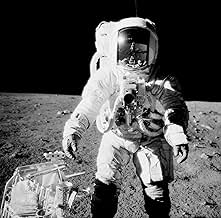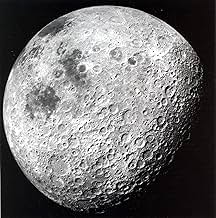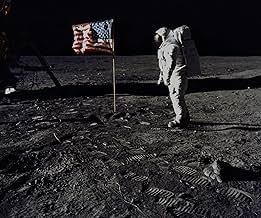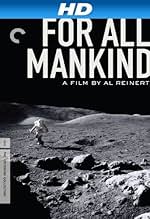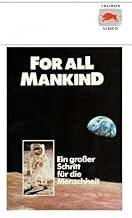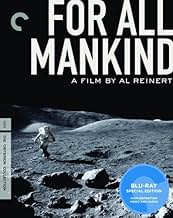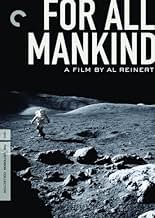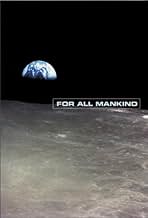ÉVALUATION IMDb
8,1/10
6,9 k
MA NOTE
Ajouter une intrigue dans votre langueAn in-depth look at various NASA moon landing missions, starting with Apollo 8.An in-depth look at various NASA moon landing missions, starting with Apollo 8.An in-depth look at various NASA moon landing missions, starting with Apollo 8.
- Nommé pour 1 oscar
- 3 victoires et 3 nominations au total
Jim Lovell
- Narrator - Apollo 8, Apollo 13
- (voice)
- (as James A. Lovell Jr.)
Ken Mattingly
- Narrator - Apollo 16
- (voice)
- (as T. Kenneth Mattingly II)
Russell Schweickart
- Narrator - Apollo 9
- (voice)
- (as Russell L. Schweickart)
Eugene Cernan
- Narrator - Apollo 10, Apollo 17
- (voice)
- (as Eugene A. Cernan)
Charles Conrad
- Narrator - Apollo 12
- (voice)
- (as Charles P. Conrad Jr.)
Richard Gordon
- Narrator - Apollo 12
- (voice)
- (as Richard F. Gordon Jr.)
Alan Bean
- Narrator - Apollo 12
- (voice)
- (as Alan L. Bean)
Jack Swigert
- Narrator - Apollo 13
- (voice)
- (as John L. Swigert Jr.)
Stuart Roosa
- Narrator - Apollo 14
- (voice)
- (as Stuart A. Roosa)
James Irwin
- Narrator - Apollo 15
- (voice)
- (as James B. Irwin)
Charles Duke
- Narrator - Apollo 16
- (voice)
- (as Charles M. Duke Jr.)
Harrison Schmitt
- Narrator - Apollo 17
- (voice)
- (as Harrison H. Schmitt)
Buzz Aldrin
- Self
- (archive footage)
Bill Anders
- Self
- (archive footage)
Neil Armstrong
- Self
- (archive footage)
Stephen Bales
- Self
- (archive footage)
- (as Steve Bales)
Frank Borman
- Self
- (archive footage)
Avis en vedette
I taped this off British TV in 1989 or 1990, and could never understand why nobody I speak to has ever heard of it! Even real space enthusiasts have not seen or heard of this wonderful film. Even today it remains unavailable on DVD except in the USA (buy an import from Amazon, well worth it!).
Quite simply there is no better way to tell the story of such a unique and special journey than in the words of those who undertook it. Here we have the live radio transmissions between the astronauts and Houston, reminiscences from the astronauts a decade or so after and no interference from any professional actor/narrator. There is footage even the most obsessed space enthusiast will not have seen, especially the 8mm film shot by the astronauts themselves.
This film presents, in a mere 80 minutes, the story of the Apollo missions from pre-launch preparations though the journey, their time on the surface of the moon to the take-off from the moon and safe return to earth. The views are as majestic as any on the earth, all accompanied by soft and appropriately ethereal music.
Why this hidden gem of a film is not constantly being broadcast on a documentary channel or even entertainment stations is totally beyond me - and also beyond those I have shared the DVD with. Seek out this film and watch it. As a friend said to me, "why is it we can walk into any shop and buy row upon row of rubbish and we cannot buy this, which shows a real achievement of mankind".
Quite simply there is no better way to tell the story of such a unique and special journey than in the words of those who undertook it. Here we have the live radio transmissions between the astronauts and Houston, reminiscences from the astronauts a decade or so after and no interference from any professional actor/narrator. There is footage even the most obsessed space enthusiast will not have seen, especially the 8mm film shot by the astronauts themselves.
This film presents, in a mere 80 minutes, the story of the Apollo missions from pre-launch preparations though the journey, their time on the surface of the moon to the take-off from the moon and safe return to earth. The views are as majestic as any on the earth, all accompanied by soft and appropriately ethereal music.
Why this hidden gem of a film is not constantly being broadcast on a documentary channel or even entertainment stations is totally beyond me - and also beyond those I have shared the DVD with. Seek out this film and watch it. As a friend said to me, "why is it we can walk into any shop and buy row upon row of rubbish and we cannot buy this, which shows a real achievement of mankind".
This was effective for this viewer. Usually what that means in cases like this is that it made me cry.
The hook is that it reviews its subject through the eyes of the astronauts. I was wary of this. I got involved in the program later, during the beginning of the shuttle era and even then the astronauts were pretty much there only to have been taken there. They were chosen some of them for how good they looked on newsprint.
The magic of the program and its heroes were a few visionaries and an army of competent engineers.
Yet it was effective because we see the story through the eyes of witnesses. There role here is simply as witness, and if you were alive during this time, you will be impressed at how it affects you.
There were all sorts of paths that could have been followed in this. The quest of man to explore; the mysteries of the unknown; the vast game being played by two enemies to demonstrate superiority of ideology; the hidden weapons programs.
They cover all these slightly except that last, and that's excusable because these witnesses saw none of that. But the story that dominates is the Kennedy one. Its hard to imagine today, but we loved our president and he deserved it. He was intelligent and articulate. His advisers came off not as louts or bullies, but men (and a few women) smart enough for difficult times. He was the Peace Corps president.
Kennedy promised to go to the moon and return without consulting anyone at NASA, and riding on the crest of a national enthusiasm for science and hardware. The nation really was engaged. And then he was killed, and with our rising self-doubt (Vietnam, race) we decided that as a people we owed it to him, or what he stood for. So when it happened, and the world watched, re affirmed the man and what he stood for. It was a good feeling, not pride as much as wonder about who we discovered ourselves to be.
This will evoke that same feeling again, the original tears, followed by tears of disappointment at the massive collapse of esteem which followed. A serious of botched opportunities to be worthy of the accomplishment.
Its an effective documentary in that regard, all the more so since everything was designed to be photographed, and was. If you really want to learn of this program, you need to go elsewhere, But this delivers on the promise.
Ted's Evaluation -- 3 of 3: Worth watching.
The hook is that it reviews its subject through the eyes of the astronauts. I was wary of this. I got involved in the program later, during the beginning of the shuttle era and even then the astronauts were pretty much there only to have been taken there. They were chosen some of them for how good they looked on newsprint.
The magic of the program and its heroes were a few visionaries and an army of competent engineers.
Yet it was effective because we see the story through the eyes of witnesses. There role here is simply as witness, and if you were alive during this time, you will be impressed at how it affects you.
There were all sorts of paths that could have been followed in this. The quest of man to explore; the mysteries of the unknown; the vast game being played by two enemies to demonstrate superiority of ideology; the hidden weapons programs.
They cover all these slightly except that last, and that's excusable because these witnesses saw none of that. But the story that dominates is the Kennedy one. Its hard to imagine today, but we loved our president and he deserved it. He was intelligent and articulate. His advisers came off not as louts or bullies, but men (and a few women) smart enough for difficult times. He was the Peace Corps president.
Kennedy promised to go to the moon and return without consulting anyone at NASA, and riding on the crest of a national enthusiasm for science and hardware. The nation really was engaged. And then he was killed, and with our rising self-doubt (Vietnam, race) we decided that as a people we owed it to him, or what he stood for. So when it happened, and the world watched, re affirmed the man and what he stood for. It was a good feeling, not pride as much as wonder about who we discovered ourselves to be.
This will evoke that same feeling again, the original tears, followed by tears of disappointment at the massive collapse of esteem which followed. A serious of botched opportunities to be worthy of the accomplishment.
Its an effective documentary in that regard, all the more so since everything was designed to be photographed, and was. If you really want to learn of this program, you need to go elsewhere, But this delivers on the promise.
Ted's Evaluation -- 3 of 3: Worth watching.
I won't reiterate all of the praise of this film except to say that if I had just few more spare dollars when it was released on laserdisc, I would have bought a laserdisc player just for this title (and 2001). Fortunately years later I've already purchased a DVD player and For All Mankind has finally been released on that format.
To me the defining moment of this film is the lunar lander slowly returning to the command module. At first we only see the cratered surface of the Moon moving below at incredible speed. Then we see a tiny motionless speck above it. Was it a defect in the lens? Of course not. It's the lunar lander slowly returning from the surface. It seems to take much longer than it really does because there are no cuts and no narrator explaining what we already know we're seeing. There's only a dot turning into a space ship. What more could you add to this amazing sight?
To me the defining moment of this film is the lunar lander slowly returning to the command module. At first we only see the cratered surface of the Moon moving below at incredible speed. Then we see a tiny motionless speck above it. Was it a defect in the lens? Of course not. It's the lunar lander slowly returning from the surface. It seems to take much longer than it really does because there are no cuts and no narrator explaining what we already know we're seeing. There's only a dot turning into a space ship. What more could you add to this amazing sight?
This film is a retelling of arguably one of the greatest achievements of the human race. In summer 1969, on a bright sunny morning, a group of astronauts led by commander Neil Armstrong climbed into the Saturn V rocket ready for its first flight. Not even 70 years had passed since planes had been invented. About 1 million people had gathered at the Kennedy Space Center in Florida to witness the once in a lifetime event, and millions more watched the entire thing on television. This film attempts to recapture some of that excitement that must have been everywhere on that day. It features interviews with the people who were brave enough to leave Earth in order to visit a place that has always watched over humanity, quite literally. At some points, it feels almost like a horror movie because nobody in the rocket or back on Earth knew if the thing would just blow up in flight for no reason, and the inside of the rocket module looks incredibly small. One of the astronauts says how strange of an experience it was and how going to the moon isn't like travelling to any other place, because when you travel somewhere, you have various landmarks to tell how far you got. On the moon mission, he says you leave Earth, pass an unimaginably large area of absolutely nothing for a few days, and suddenly, you're at the moon. There is nothing in between. The fact that the moon is only about a quarter of a million miles from Earth while stars are so far away you couldn't reach them even if you travelled your whole life makes it even more daunting. After the module lands on the surface, Neil says his famous line, and we see more very impressive shots of what the surface of the moon looks like. It has a depressing feel to it because the only colors are gray and black, but at the same time, it has a triumphant feel. The moon has been waiting thousands of years for people to go there, and the men reflect this by saying even though they knew they might not come back, they felt at home there. The soundtrack for this movie also gives it a sad feel that makes you realize how vast and empty space is. They show many things that seem unbelievable, even to experienced astronauts, such as small dots of light on the African continent (they're actually fires started by tribes), and having their food float in zero gravity when they're trying to eat. This is something that everyone should see at least once, because it discusses one of humanity's biggest accomplishments. To this day it's strange to think it was done in the 60s. Not many people have been to space, so you will be amazed watching this.
Great footage, but the missions are all over the place without really telling us. If you don't have a little knowledge beforhand, like Apollo 13, you're pretty much left in the dark which mission is which and may think it was just 1 mission to the moon (and back obviously). Started to really dawn on me when Apollo 13 had that breathing problem (which was solved in a jiffy in this documentary) and then a crew was going for a moonlanding ( which obviously Appolo 13 never did. But hey when you hear the name Neil Armstrong you are pretty much back on course. Ah okay great i am seeings Apollo 11 and the first moonlanding at the moment : )
Footage: 8.5 Overall Docu : 6.
Footage: 8.5 Overall Docu : 6.
Le saviez-vous
- AnecdotesThe staging footage was captured because NASA wanted to document the flight process of an unmanned Saturn flight for feedback in case there was a failure for engineers to look at footage to see what went wrong. Cameras were mounted in strategic locations, kicking on at critical moments to document the staging process for less than half a minute. After completion, the light-tight canisters containing the exposed film were jettisoned, dropping to earth with homing beacons and parachutes inside protective heat shields. Air Force C-130 transport planes, towing gigantic nets, recovered the canisters in the southern Atlantic Ocean.
- GaffesThe opening of the documentary incorrectly states that: "During the four year between December 1968 and November 1972, there were nine manned flights to the moon." The last lunar mission, Apollo 17, took place in December 1972.
- Citations
Charles M. Duke Jr.: The only bad part about zero gravity in Apollo was goin' to the bathroom. We had a very crude system. For your feces it was a bag, and you put this bag in the right position. So you go, but the only thing is that nothing goes to the bottom of the bag in zero gravity.
- Générique farfeluFilmed on location by the United States National Aeronautics and Space Administration.
- Bandes originalesSirens
Courtesy of Opal Records (Music For Films III)
Written and Performed by Daniel Lanois and Brian Eno
Licensed by Upala Music/Hamstein (BMI)
Meilleurs choix
Connectez-vous pour évaluer et surveiller les recommandations personnalisées
- How long is For All Mankind?Propulsé par Alexa
Détails
- Date de sortie
- Pays d’origine
- Langue
- Aussi connu sous le nom de
- National Geographic: For All Mankind
- Lieux de tournage
- Sea of Tranquility, The Moon, Space(Apollo 11 landing site)
- sociétés de production
- Consultez plus de crédits d'entreprise sur IMDbPro
Box-office
- Brut – États-Unis et Canada
- 770 132 $ US
- Fin de semaine d'ouverture – États-Unis et Canada
- 33 777 $ US
- 5 nov. 1989
- Brut – à l'échelle mondiale
- 770 366 $ US
- Durée1 heure 20 minutes
- Couleur
- Mixage
- Rapport de forme
- 1.37 : 1
Contribuer à cette page
Suggérer une modification ou ajouter du contenu manquant

Lacune principale
By what name was For All Mankind (1989) officially released in India in English?
Répondre


